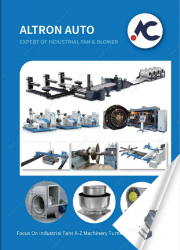Navigating Challenges and Success Stories in Forming Manufacturing
Forming manufacturing is a cornerstone of the industrial world, playing a pivotal role in shaping raw materials into the finished products that define our daily lives. It encompasses a variety of processes, each serving a unique purpose in transforming metals into functional components.
The significance of forming processes extends across diverse industries, from automotive and aerospace to construction and electronics. ALTRON, a leading manufacturer in the field, has been at the forefront of innovative forming technologies, celebrating its one-year milestone of excellence.
ALTRON’s commitment to advancing forming manufacturing in metal is evident in the innovative design and capabilities of its machines. From precision spinning to robust forging and cold striking, each machine caters to specific needs in diverse industries. As ALTRON continues to push the boundaries of metal forming technology, its machines stand as reliable tools, shaping the future of manufacturing with precision, strength, and efficiency.
Section 1: Overview of Forming Manufacturing
At its core, forming manufacturing involves manipulating materials, typically metal, to achieve desired shapes and properties. Precision and efficiency are paramount in these processes, ensuring the creation of high-quality components with consistent results. From intricate designs to large-scale production, forming methods are versatile, making them indispensable in modern manufacturing.
a. Unveiling Precision: The Square Blank Inner Spinning Machine
ALTRON’s Square Blank Inner Spinning Machine stands as a testament to precision in metal forming. This advanced machinery excels in creating intricate shapes with tight tolerances. It utilizes the spinning process to form square blanks, a feat that showcases its versatility. The advantages of this machine lie in its ability to produce complex geometries, ensuring components with superior accuracy and surface finish. Applications range from aerospace components requiring intricate designs to architectural elements demanding precision.
b. Forging Ahead: Casing & Forging Hub Wheel Spinning Machine
In the realm of forging, ALTRON’s Casing & Forging Hub Wheel Spinning Machine takes center stage. This robust machine is designed for creating hub wheels with enhanced strength and durability. By leveraging the forging process, it imparts structural integrity to the metal, resulting in components that can withstand rigorous conditions. Automotive and heavy machinery industries find applications for this machine, benefitting from the exceptional strength and longevity of the forged hub wheels it produces.
c. The Hub Wheel Spinning Machine: Revolutionizing Component Production
The Hub Wheel Spinning Machine by ALTRON is a game-changer in metal forming. This machine specializes in spinning hub wheels, catering to various industries requiring reliable and precisely formed components. Its advantages lie in the efficiency and scalability of the spinning process. ALTRON’s machine ensures a seamless production line for hub wheels, meeting the demands of mass production without compromising on quality. From automotive hubs to industrial machinery components, this machine plays a pivotal role in diverse manufacturing sectors.
Precision Strikes: Spline Shaft Cold Striking Machine
ALTRON’s Spline Shaft Cold Striking Machine brings cold forming to the forefront of metal manufacturing. This machine excels in creating spline shafts with exceptional precision and efficiency. Cold striking imparts strength to the metal without the need for excessive heat, resulting in components with improved mechanical properties. Industries requiring high-strength shafts, such as automotive and machinery manufacturing, find the Spline Shaft Cold Striking Machine indispensable for producing reliable and durable components.
Section 2: Common Forming Methods: Forming Manufacturing
a. Casting:
Casting, a foundational forming method, involves pouring molten metal into a mold to create a desired shape upon cooling. ALTRON leverages casting for a range of applications, from producing intricate components with high detail to large, complex structures. The advantages of casting include its suitability for a wide array of metals and the ability to create intricate shapes. However, challenges such as porosity and surface finish variation must be carefully addressed to ensure optimal results.
b. Forging:
Forging, a process where metal is shaped through localized compressive forces, stands out for its strength and durability benefits. ALTRON utilizes forging to create robust components like hubs and shafts. The controlled deformation during forging enhances the structural integrity of the metal, resulting in products with superior strength and toughness. This method is particularly valuable in applications where durability is non-negotiable.
c. Stamping:
Stamping is a high-speed forming method involving the use of dies to cut or shape metal sheets. ALTRON employs stamping for mass production of components, achieving both efficiency and precision. This method allows for the creation of intricate designs with minimal material waste, making it a preferred choice for industries where high volumes of standardized parts are required.
Section 3: Materials Used in Forming Manufacturing
The materials used in forming manufacturing are as diverse as the processes themselves. ALTRON meticulously selects materials based on the specific requirements of each forming method. Whether it’s the malleability of aluminum for casting, the toughness of steel for forging, or the precision of high-strength alloys for stamping, material selection is a critical factor in ensuring the success of the forming process.

Section 4: Technological Advances in Forming Manufacturing
Recent technological innovations have significantly transformed forming manufacturing, enhancing efficiency and precision.
a. Automation:
ALTRON embraces automation to streamline processes and reduce human error. Automated systems, integrated into various stages of manufacturing, ensure consistency and efficiency, contributing to improved overall product quality.
b. Robotics:
The integration of robotics in forming manufacturing brings increased speed and accuracy. Robots are employed for tasks such as material handling, machining, and quality inspection, enhancing both productivity and safety in the manufacturing environment.
c. Digital Technologies:
Digital technologies, including data analytics and simulation tools, enable predictive maintenance and process optimization. ALTRON utilizes these tools to analyze vast amounts of data, ensuring proactive maintenance of machinery and continuous improvement in forming processes.
Section 5: Challenges and Solutions: Forming Manufacturing
a. Common Challenges in Forming Manufacturing:
Forming manufacturing, while integral to various industries, is not without its challenges. Common issues include material defects, inconsistent quality, and the need for extensive post-processing. These challenges can affect efficiency, cost-effectiveness, and the overall success of a project.
b. Quality Control Measures:
Addressing challenges begins with robust quality control measures. ALTRON employs advanced inspection technologies to identify and rectify material defects early in the process. The integration of real-time monitoring systems ensures that each component meets stringent quality standards, minimizing the risk of inconsistencies.
c. Process Optimization:
Efficiency is key in forming manufacturing. ALTRON focuses on process optimization through continuous refinement of techniques and machinery. By streamlining workflows and utilizing state-of-the-art equipment like the Square Blank Inner Spinning Machine, the company maximizes productivity while maintaining high-quality standards.
Section 6: Case Studies: Forming Manufacturing
a. Project A: Precision Casting for Industrial Fan Components
ALTRON’s expertise in precision casting was showcased in a project for Industrial Fan Components. By utilizing advanced casting methods, the company achieved intricate designs and maintained tight tolerances crucial for Industrial Fan applications. The success of this project emphasized the role of forming processes in delivering components with both precision and reliability.
b. Project B: Forged Components for Automotive Durability
In a venture focusing on automotive applications, ALTRON leveraged forging methods to produce components with unparalleled strength and durability. The forged parts exhibited superior performance under rigorous testing, showcasing the impact of forming processes on the longevity and reliability of automotive components.
c. Project C: Stamping for Mass Production of Consumer Electronics
ALTRON’s stamping capabilities were highlighted in a project catering to the consumer electronics sector. The company efficiently produced high volumes of intricate components, demonstrating the cost-effectiveness and scalability of stamping in mass production. This case study underscored the role of forming processes in meeting the demands of modern manufacturing.
Section 7: Advantages Across the Board: ALTRON’s Commitment to Excellence
ALTRON’s suite of forming manufacturing machines shares common advantages that contribute to the company’s reputation for excellence. These advantages include:
a. Precision and Consistency:
All ALTRON machines prioritize precision, ensuring that each formed component meets the specified requirements with consistency. Whether it’s the intricate shapes produced by the Square Blank Inner Spinning Machine or the precisely forged hub wheels, ALTRON machines deliver on accuracy.
b. Strength and Durability:
Forging and cold striking processes employed by ALTRON’s machines contribute to the strength and durability of the formed components. The resulting products exhibit enhanced mechanical properties, making them ideal for applications where robustness is non-negotiable.
c. Scalability and Efficiency:
ALTRON’s machines are designed for scalability and efficiency, allowing for both small-scale production runs and large-scale manufacturing. The Hub Wheel Spinning Machine, in particular, exemplifies the efficiency required for mass production without compromising on the quality of the formed components.
Conclusion
In conclusion, forming manufacturing in metal is a dynamic field, constantly evolving to overcome challenges and embrace technological advancements. Through meticulous quality control, process optimization, and real-world case studies, ALTRON exemplifies the commitment to delivering high-quality, cost-effective components that meet the diverse needs of industries worldwide. As the industry continues to evolve, ALTRON’s innovative approach positions it as a leader in shaping the future of forming manufacturing.


